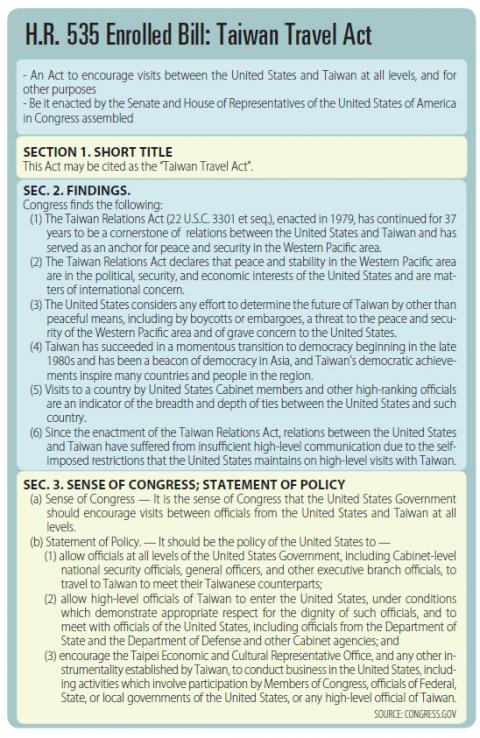US President Donald Trump and President Tsai Ing-wen (蔡英文), as well as Cabinet-level officials from Taiwan and the US, should meet each other to discuss issues of mutual interest, former US deputy secretary of state Richard Armitage said in a paper published by US think tank Project 2049 on Friday.
In a paper titled US-Taiwan Relations in a Sea of Change: Navigating Toward a Brighter Future, coauthored with Ian Easton and Mark Stokes, Armitage made policy recommendations for US-Taiwan relations, one of which is that Trump and Tsai should have a face-to-face meeting.
Such a meeting should address issues of shared interest and concern, the paper said, adding that it would shatter practice since 1979, when the two nations severed official diplomatic ties.

It would also have far greater implications for the US, Taiwan and China than the telephone call between Tsai and Trump on Dec. 2, 2016, when Trump was still president-elect, the paper said.
The recommendation is in line with the Taiwan Travel Act, which was signed into law by Trump on Friday and encourages bilateral visits between government officials at all levels.
Other policy recommendations all addressed how the US could be more active in its relationship with Taiwan.
“The Trump administration should convene an interagency policy working group to evaluate how best to achieve a normal, stable and constructive relationship with Taiwan over the long term,” the paper said.
The US government should also begin negotiating a free trade agreement with Taiwan that is “equal or better than the ones it already has with South Korea, Singapore and Australia,” it added.
The Trump administration should routinize the process of addressing Taiwan’s requests for arms sales and commercial export licenses to assist Taiwan’s indigenous submarine program, and provide timely responses, the paper said.
The US government should base arms sales decisions “solely on considerations of Taiwan’s strategic and operation requirements, which are inherently defensive in nature,” it said.
“Beijing should not be consulted in advance of arms sales to Taiwan,” the paper said, adding that “meeting commitments to regional stability should be considered a more important priority” than US-China diplomatic exchanges.
The paper also said that the Trump administration should “develop and implement a joint workplan for bilateral defense and security relations.”
“Deepened and broadened defense interactions with Taiwan could include training and exercises, modest ports of call in support of humanitarian assistance and disaster relief missions, and regular exchanges of military officers with joint command experience,” it added.
The US Department of State should launch a new initiative to increase the number of exchanges with Taiwan, especially ones pertaining to education and culture, the paper said.
The paper also recommended establishing a “US national committee on US-Taiwan relations” to encourage understanding between Americans and Taiwanese.
Finally, the Trump administration should develop and implement US-Taiwan bilateral working groups on supply chain security and defense industry cooperation “to ensure that the cutting-edge technologies of tomorrow are harnessed for advancing shared values and interests,” the paper said.
Additional reporting by CNA

US President Donald Trump said "it’s up to" Chinese President Xi Jinping (習近平) what China does on Taiwan, but that he would be "very unhappy" with a change in the "status quo," the New York Times said in an interview published yesterday. Xi "considers it to be a part of China, and that’s up to him what he’s going to be doing," Trump told the newspaper on Wednesday. "But I’ve expressed to him that I would be very unhappy if he did that, and I don’t think he’ll do that," he added. "I hope he doesn’t do that." Trump made the comments in

NOT AN OPENING: Trump’s violation of international law does not affect China’s consideration in attacking Taiwan; Beijing lacks capability, not precedent, an official said Taiwanese officials see the US’ capture of the president of Venezuela as a powerful deterrent to Beijing’s aggression and a timely reminder of the US’ ability to defeat militaries equipped with Chinese-made weapons. The strikes that toppled Venezuelan President Nicolas Maduro signaled to authoritarian leaders, including Chinese President Xi Jinping (習近平), US President Donald Trump’s willingness to use military might for international affairs core to US interests, one senior official in Taipei’s security circle said. That reassured Taiwan, the person said. Taipei has also dismissed the idea that Trump’s apparent violation of international law could embolden Beijing, said the official, who was not

A cold surge advisory was today issued for 18 cities and counties across Taiwan, with temperatures of below 10°C forecast during the day and into tonight, the Central Weather Administration (CWA) said. New Taipei City, Taipei, Taoyuan and Hsinchu, Miaoli and Yilan counties are expected to experience sustained temperatures of 10°C or lower, the CWA said. Temperatures are likely to temporarily drop below 10°C in most other areas, except Taitung, Pingtung, Penghu and Lienchiang (Matsu) counties, CWA data showed. The cold weather is being caused by a strong continental cold air mass, combined with radiative cooling, a process in which heat escapes from

Snow this morning fell on Alishan for the first time in seven years, as a strong continental cold air mass sent temperatures plunging across Taiwan, the Central Weather Administration (CWA) said. The Alishan weather station, located at an elevation of about 2,200m in central Taiwan, recorded snowfall from 8:55am to 9:15am, when the temperature dropped to about 1°C, the CWA said. With increased moisture and low temperatures in the high-altitude Alishan area, the conditions were favorable for snow, CWA forecaster Tsai Yi-chi (蔡伊其) said. The last time snow fell at the Alishan weather station was on Jan. 10, 2018, while graupel fell there